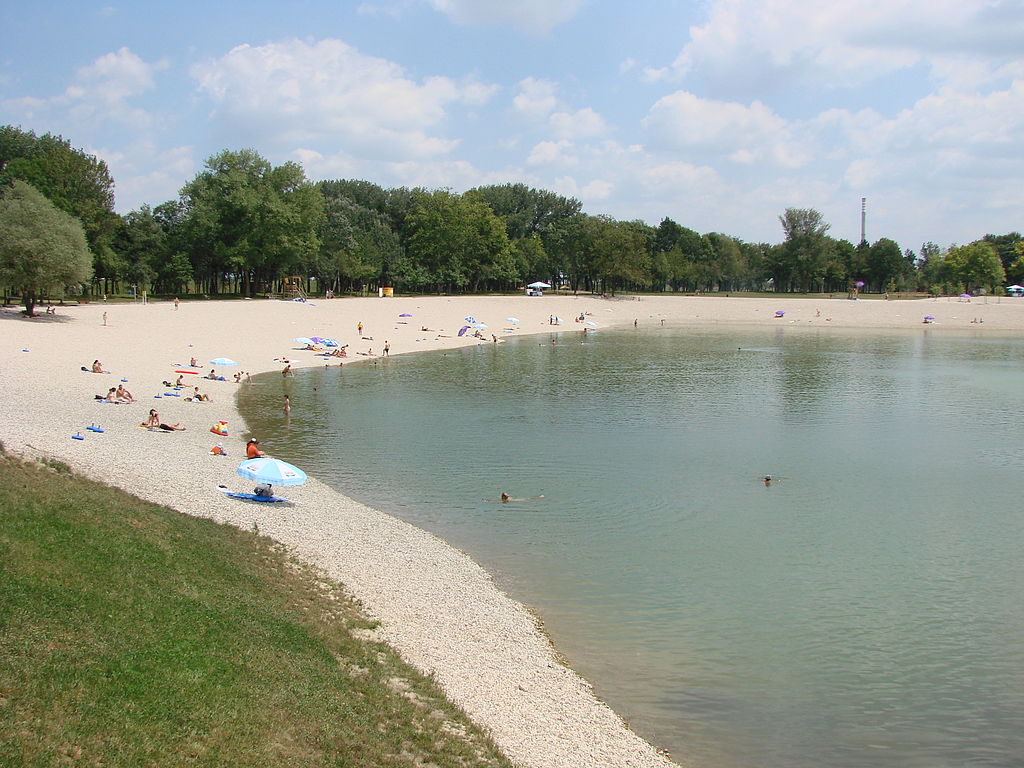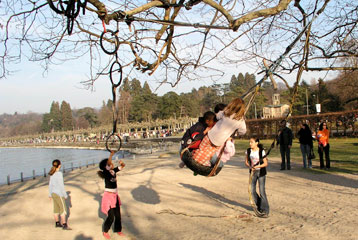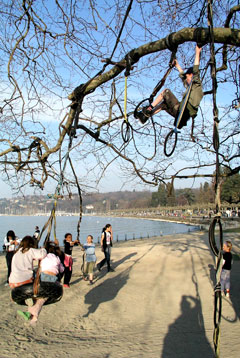The Best Urban Beaches
Who else is looking forward to the summer? Whether you call your summer break a ‘vacation’ or a ‘holiday’, there is a good chance that some of you are heading for the beach.
Did you know that around the world there are hundreds of artificial beaches. Some are near the coast, but others are miles away from the seaside – perfect for those who don’t or can’t travel far.
City beaches are sometimes called ‘urban beaches’ like the one above in Cologne, Germany. This can involve the delivery of hundreds of tonnes of sand, to a place where there is no sand.
Islands Brygge, Copenhagen, Denmark
There is no sand here, but it is an oasis of fun in the middle of the city. For many years, this area was run down and neglected, but after a regeneration project, new life is blossoming. Who wants to jump off this diving board?
Festival of Love Beach, South Bank, London UK
This beach is all about relaxing and digging your feet into the sand. No pool (and the chilly Thames is certainly no alternative!) but great views over London, and the South Bank centre often has great activities for kids on offer. Check out their website for details.
Paris Plage, France
The capital city of France can get really hot and muggy in the summer months, so what better way than to cool off at an urban beach? Check out the huge showers in the picture!
Bundek Lake, Zagreb, Croatia

In the south of the city of Zagreb, this park was brought back to life after many years of neglect. It is a popular spot for locals and tourists alike, hoping to cool off in the hot Croatian summers.
Baby Plage, Geneva, Switzerland


Baby Plage, Geneva
This might be the MOST fun urban beach for kids in the world. The huge trees are festooned with old tyres and bicycle tubes, knotted together to create ladders and swings.
San Alfonso del Mar, Chile
Ok, this is a bit of a cheat, cause it isn’t an urban beach, but it is the biggest swimming pool in the world, so we had to include it! It is 8 hectares, and holds 250 million liters of water. That is equivalent of 6,000 familiar 8m long pools! It is part of a privately owned complex in South America.
BONUS BEACHES
 Now, don’t tell your parents that we showed you this, and don’t try it out at home, but how awesome does this look? We can’t help thinking that this would be VERY messy, but it looks so relaxing and fun!
Now, don’t tell your parents that we showed you this, and don’t try it out at home, but how awesome does this look? We can’t help thinking that this would be VERY messy, but it looks so relaxing and fun!
The artist Justin Kemp created home sandbox for under his desk.
 This was built in Japan in 1993 – an artificial beach with a retractable roof. It was not commercially successful and closed over 10 years ago. Which is a real shame, because it looks really amazing.
This was built in Japan in 1993 – an artificial beach with a retractable roof. It was not commercially successful and closed over 10 years ago. Which is a real shame, because it looks really amazing.
Featured Image – Cologne KM689 Beach Bar in Germany
What is Juno?
There has been a lot of excitement about the Juno probe this week, but what is it and what is its mission?
What is Juno?
Juno is a spacecraft designed and operated by NASA, the US space agency. It was launched from Cape Canaveral on the 5th August 2011 and has taken almost 5 years to travel the 716 million kilometres to Jupiter, the largest planet in our solar system. Juno is 3.5 metres in height, and when its solar arrays are extended it’s more than 20 metres across. These arrays are covered in more than 18,500 solar cells, which allows Juno to operate even when it’s at such a great distance from the Sun.

(Image: NASA)
Why is it called Juno?
In Roman mythology Juno was the Queen of the gods. She was married to the king, Jupiter, who wasn’t always well-behaved. Juno had to peer through the clouds to discover what he was up to; the spacecraft is called Juno because it will be looking beneath the clouds that cover the surface of the planet Jupiter.
Aboard the Juno craft are 3 models of Lego minifigures: Jupiter, Juno and Galileo, who discovered in 1610 that Jupiter had moons.

From left to right: Galileo, Juno and Jupiter. (Image: NASA/JPL-Caltech/LEGO).
What is it looking for?
Jupiter is enormous; it’s two and a half times larger than all the other planets in our solar system combined. It’s made entirely of gases and is believed to have no solid surface. The planet rotates at an immense speed, completing one rotation every ten hours, and telescopes have shown us that it has a cloudy atmosphere with colourful spots and stripes. The largest of these, known as the Great Red Spot, is a storm that is several times the size of Earth and has been raging for more than 300 years.

Jupiter. The Great Red Spot is clearly visible. (Image: NASA).
This mission is the first time that humans will be able to glimpse what lies beneath Jupiter’s cloudy atmosphere. The main objective is to understand how the planet formed and evolved, which will give us more information about the formation of gas giants as well as the rest of the solar system. Juno will also measure the quantities of water and ammonia within the atmosphere, examine the magnetic field that surrounds the planet, observe any polar auroras and measure the gravity to see whether a solid core may exist after all.
For more information about the Juno mission you can watch this video from Nasa, and have a look at the Juno mission webpage.
Tips For Exam Success
How to tackle exam stress and emerge still smiling…
Whether it’s SATs, school entrance exams or simply a test of your knowledge at the end of a topic – exams can be scary. They don’t have to be.
English teacher and tutor Allana has witnessed firsthand the effects of exam stress on very capable students – even those who KNOW the answers can get rattled on the big day.
A Day in the Life of… a Structural Engineer
You might be starting to think about which subjects you want to study at school, perhaps you have even had a talk about careers.
One thing that is quite tricky to assess is what a job is REALLY like. Some jobs are quite easy to imagine, such as working as a teacher, because we see the work that teachers do every day. Some jobs are a bit of a mystery. What does an engineer actually DO? And what do you have to study, to become one?
Today we are introducing a new series of articles, which will show you the typical working life of people in many different professions. If you know someone who has an interesting or unusual career, ask them if they would agree to a short interview with us to show kids a day in their life.
We were lucky enough to interview Tasha Scott, who was happy to explain to us her studies and career as a Structural Engineer.









